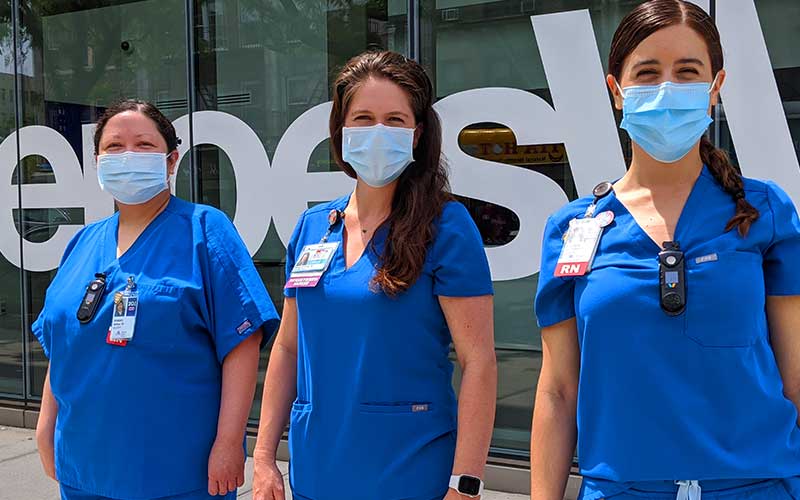
From left: The Rev. Dr. Rachelle Zazzu, Chaplain; Melissa Farmer, RN; Stefanie Dimitriadis, RN; Amparo Sullivan, RN; Jonathan Nover, RN, MBA, Senior Director of Nursing for the Emergency Department; and Francelia Thomas, RN, Nurse Manager.
The nurses of Mount Sinai Queens are giving a precious gift to families of patients who succumbed to COVID-19 during the height of the pandemic—their memories of the patients’ last days.
In one letter, carefully hand-written on lined paper, Amparo Sullivan, RN, reached out to the family of a patient who had “a nice smile behind her oxygen mask” and had spent peaceful moments chatting and holding her hand. “This courageous woman wasn’t just thinking about herself but was deeply concerned about how the pandemic was affecting us,” Ms. Sullivan wrote. “Her bravery and thoughtfulness gave me inspiration.”
Since May, Mount Sinai Queens nurses have been writing such letters to family members, in a program that arose from their determination to console families and their own need to remember the patients they worked so hard to save. The hospital is now returning to normal operations. But in April and early May, Mount Sinai Queens was hard hit by the pandemic; visitors were not allowed at that time, out of an abundance of caution, to help protect patients and staff.
“Our nurses were caring for people as they died, and I was praying for people as they died, and no family was present. And it’s heartbreaking,” says the Rev. Dr. Rachelle Zazzu, MA, DDS, Staff Chaplain for Mount Sinai Queens. “So we have been writing letters to the families, fundamentally saying, ‘Your mother was not just patient No. 1234. We cared for her, and we saw beauty in her, and we want you to know that when she died, she was taken care of with a lot of care.’”
So far about a dozen letters have been written by nurses including Ms. Sullivan, Melissa Farmer, RN, Stefanie Dimitriadis, RN, and Tamara Boncic-Heins, RN. The program began with a suggestion from Ms. Sullivan, says Jonathan Nover, RN, MBA, Senior Director of Nursing for the Emergency Department (ED) at Mount Sinai Queens.
“It was a very emotional time for everyone in the ED. So what Ampy Sullivan envisioned was this: If you are with a patient who is at an end-of-life moment and there is something you would like to share later with the patient’s family, jot down a note with the details and drop it into our Daisy box,” Mr. Nover said, referring to an awards program at the hospital. “Then the goal would be, when things calm down a little bit, to create a procedure for getting those letters to the patients’ families.

From left: Amparo Sullivan RN, Melissa Farmer RN, and Stefanie Dimitriadis RN.
That is indeed what happened. In addition to compiling the notes, Dr. Zazzu and Mr. Nover reached out to nurses for more remembrances during the daily huddles of departments such as the ED and Preoperative, Postoperative, and Palliative Care. Even after many weeks, the nurses had “amazing, vivid memories,” Mr. Nover says.
The nurses were told, “We don’t want this to be a burden, because you have a lot to do,” Dr. Zazzu says. “We are just saying that if writing a letter can help relieve a burden for you, all you have to do is write it, and I will take care of the rest, make sure it gets to the family.”
After receiving the letters, family members have been writing back in profound gratitude. One family called the Mount Sinai Queens nurses “RN angels” and offered to pray for their safety as they cared for patients. The letter-writing program is now well-established at Mount Sinai Queens, Mr. Nover and Dr. Zazzu say. And they hope it can spread through the Health System and beyond, because even though the crisis has waned in New York City, patients can still die without family members, far from home.
“It’s nice that we can tell families about their loved ones, and their stay, and how it affected us,” Ms. Sullivan says. “We hope it will give them a little peace of mind, and it’s therapeutic for us to share these experiences.”
Here are some of the messages from nurses to families, from heart to heart.
“Your mother was in no distress when she passed peacefully. I spoke to her, and told her how much her family loves her.”
“Your father was so, so brave. I won’t forget him.”
“People show you who they are down to the core when they are in life-and-death situations. Your mother was so kind. I prayed for her on my lunch break.”
